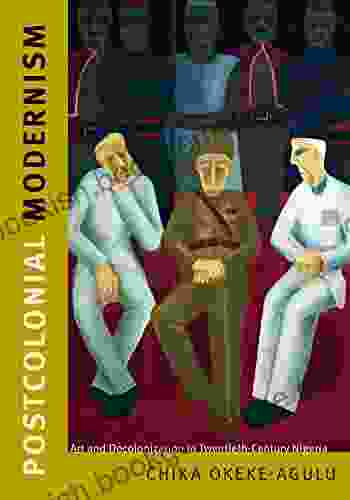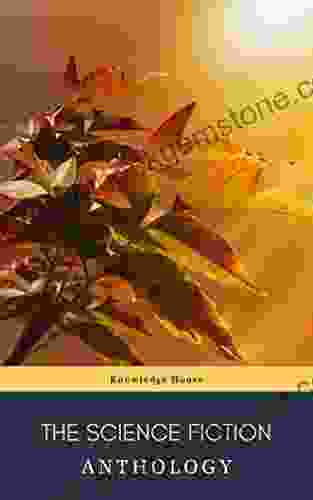Art and Decolonization in Twentieth Century Nigeria: Exploring the Narrative of Liberation, Identity, and Resistance

The twentieth century marked a complex and transformative era in the history of Nigeria, a nation grappling with the legacies of colonialism and the struggle for decolonization. Amidst the political and social upheavals, art emerged as a powerful medium for expressing the aspirations, frustrations, and cultural resilience of the Nigerian people. This essay examines the multifaceted role of art in the decolonization process, focusing on its contributions to the narratives of liberation, identity formation, and resistance.
The Impact of Colonialism on Nigerian Art
Before the advent of European colonialism, Nigeria was home to diverse and vibrant artistic traditions rooted in its rich cultural heritage. From the exquisite bronze sculptures of Benin to the intricate beadwork of the Igbo, Nigerian art reflected the ingenuity and creativity of its people. However, the imposition of colonial rule disrupted these artistic expressions, as Western aesthetic values and artistic practices were imposed upon the colony.
4.7 out of 5
| Language | : | English |
| File size | : | 48182 KB |
| Text-to-Speech | : | Enabled |
| Screen Reader | : | Supported |
| Enhanced typesetting | : | Enabled |
| Print length | : | 376 pages |
Colonial authorities dismissed traditional Nigerian art as "primitive" and "unworthy," relegating it to the realm of ethnographic curiosities. Artists were coerced into adopting European styles and techniques, often at the expense of their own cultural heritage. As a result, a generation of Nigerian artists emerged who were alienated from their indigenous artistic practices.
Art as a Tool of Liberation
The struggle for decolonization in Nigeria ignited a renewed appreciation for traditional art forms. Artists began to reclaim their cultural heritage, using art as a means of expressing their political and cultural aspirations. They drew inspiration from the rich symbolism and techniques of their ancestors, creating works that celebrated the beauty and resilience of the Nigerian people.
One of the most prominent examples of this was the "Mbari" movement, which emerged in the Igbo heartland in the 1940s. Mbari sculptures, traditionally created to appease the gods, were transformed into powerful symbols of cultural and political resistance. Artists used Mbari to depict the horrors of colonialism, the struggle for independence, and the hopes for a free and prosperous Nigeria.
Art and National Identity Formation
As Nigeria approached independence in the late 1950s, art played a crucial role in shaping the nation's emerging identity. Artists sought to create a new visual language that would reflect the country's aspirations and distinguish it from its colonial past. They drew upon traditional art forms, incorporating elements of symbolism, color, and design to create a uniquely Nigerian aesthetic.
The works of artists such as Ben Enwonwu, Uche Okeke, and Yusuf Grillo became iconic representations of the new Nigeria. Their paintings, sculptures, and textiles celebrated the diversity of Nigerian cultures, the struggles for independence, and the promise of a brighter future.
Art as Resistance against Neocolonialism
After independence, Nigeria continued to face the challenges of neocolonialism and cultural imperialism. Western influences continued to dominate the art scene, often marginalizing indigenous artistic practices. However, a new generation of artists emerged who challenged the prevailing neocolonial narratives and sought to reclaim their cultural autonomy.
The "Zaria Art Society," founded in the late 1950s, played a pivotal role in this resistance. Led by the renowned artist Uche Okeke, the society argued that African art should be rooted in African traditions and philosophies. They rejected the idea of a universal "modern art" style, emphasizing the importance of cultural specificity and authenticity.
Contemporary Art and the Legacy of Decolonization
In the decades since independence, Nigerian art has continued to evolve, reflecting the complex political, social, and cultural changes in the country. Contemporary artists have drawn inspiration from the decolonization era, reinterpreting its narratives and challenges in new and innovative ways.
Artists such as Ngozi Omeje, Otobong Nkanga, and Wangechi Mutu have used their work to explore issues of race, gender, and identity in a post-colonial context. They have challenged Western stereotypes and biases, while also grappling with the complexities of contemporary Nigeria.
Art played a multifaceted and transformative role in the decolonization process in twentieth-century Nigeria. It served as a powerful tool of liberation, expressing the aspirations and frustrations of the Nigerian people. It contributed to the formation of a new national identity, celebrating the country's diversity and cultural heritage. And it provided a platform for resistance against neocolonialism and cultural imperialism.
Today, the legacy of decolonization continues to inform and inspire Nigerian art. Contemporary artists are drawing upon the narratives and techniques of the past, while also exploring new and innovative ways to engage with the challenges and opportunities of the present. Through their work, they continue to shape the cultural identity and political discourse of Nigeria, ensuring that the story of decolonization remains an integral part of the nation's history and future.
4.7 out of 5
| Language | : | English |
| File size | : | 48182 KB |
| Text-to-Speech | : | Enabled |
| Screen Reader | : | Supported |
| Enhanced typesetting | : | Enabled |
| Print length | : | 376 pages |
Do you want to contribute by writing guest posts on this blog?
Please contact us and send us a resume of previous articles that you have written.
 Best Book
Best Book Page Flip
Page Flip Bookshelf
Bookshelf Literary loom
Literary loom Chapter
Chapter Bookish
Bookish PageTurner
PageTurner Bibliophile
Bibliophile Story
Story Inkwell
Inkwell Bookworm
Bookworm Labyrinth
Labyrinth Plot Twist
Plot Twist Prose
Prose Paperback
Paperback Storyteller
Storyteller Sanctuary
Sanctuary Fiction
Fiction Reading
Reading Chronicle
Chronicle Read
Read Ted Bell
Ted Bell Jl Seegars
Jl Seegars Phoenix Grey
Phoenix Grey Jennifer Wright
Jennifer Wright Megan Marshall
Megan Marshall Richard Matheson
Richard Matheson Laylah Roberts
Laylah Roberts Ronald Bergan
Ronald Bergan Timothy Brook
Timothy Brook Stephanie Nicole Norris
Stephanie Nicole Norris Mayukh Sen
Mayukh Sen Mark Odegard
Mark Odegard Ben Box
Ben Box Kim Hutchinson
Kim Hutchinson Shaka Senghor
Shaka Senghor Tim Severin
Tim Severin Paul Noble
Paul Noble Theo Hodges
Theo Hodges Stephanie Mehta
Stephanie Mehta Laird Barron
Laird Barron John Pomfret
John Pomfret John Thompson
John Thompson Candice Marie Benbow
Candice Marie Benbow Kathleen Smith
Kathleen Smith Michael Oher
Michael Oher Mike Lowery
Mike Lowery Laura Lee Fritz
Laura Lee Fritz Ashley Jaquavis
Ashley Jaquavis Patty A Wilson
Patty A Wilson Kenan Trebincevic
Kenan Trebincevic Kale James
Kale James Chika Okeke Agulu
Chika Okeke Agulu Shani Mootoo
Shani Mootoo Carly Murden
Carly Murden Azim Nanji
Azim Nanji Ellis Cose
Ellis Cose Jessica Glasscock
Jessica Glasscock Milind Mulick
Milind Mulick Sherri Granato
Sherri Granato Rosemary Mahoney
Rosemary Mahoney Steve Van Beek
Steve Van Beek Marcus Samuelsson
Marcus Samuelsson John Paul Stonard
John Paul Stonard Stephen Saad
Stephen Saad Paul Chiasson
Paul Chiasson Tom Larcombe
Tom Larcombe Richard Fleischer
Richard Fleischer Yishan Li
Yishan Li 1st Ed 2021 Edition Kindle Edition
1st Ed 2021 Edition Kindle Edition Eliot Schrefer
Eliot Schrefer M C Roberts
M C Roberts Jessica Garrison
Jessica Garrison Richard S Dunn
Richard S Dunn Richard Delacy
Richard Delacy Reanne Hemingway Douglass
Reanne Hemingway Douglass Kennedy Ryan
Kennedy Ryan Liz Hurley
Liz Hurley Patrick Mcgilligan
Patrick Mcgilligan Philip Lee
Philip Lee Michael Friel
Michael Friel Margaret Eggleton
Margaret Eggleton Shemer Kuznits
Shemer Kuznits Trevor Carroll
Trevor Carroll Cath Caldwell
Cath Caldwell Megan Carr
Megan Carr Stephen Kirkpatrick
Stephen Kirkpatrick 1st Ed 2018 Edition Kindle Edition
1st Ed 2018 Edition Kindle Edition Breanna De Shay
Breanna De Shay Marteeka Karland
Marteeka Karland Ward Eister
Ward Eister Patrice Pavis
Patrice Pavis K C Mills
K C Mills Sarah Valentine
Sarah Valentine Connie Easton
Connie Easton Shani Greene Dowdell
Shani Greene Dowdell Russ Howard
Russ Howard Marianna Leivaditaki
Marianna Leivaditaki Karma Waltonen
Karma Waltonen William Lidwell
William Lidwell Lindy Viandier
Lindy Viandier David J Schmidt
David J Schmidt Vic Shayne
Vic Shayne Christopher Reeve
Christopher Reeve Anne H Berry
Anne H Berry Myrnoska Scott
Myrnoska Scott Pero Tafur
Pero Tafur Julian May
Julian May Liz Scheier
Liz Scheier Skip Mort
Skip Mort Jason A Ramos
Jason A Ramos Nikita Thorn
Nikita Thorn Tasha Black
Tasha Black Joann Perahia
Joann Perahia Korani Connolly
Korani Connolly Nick Barratt
Nick Barratt William Hertling
William Hertling Neil Fontaine
Neil Fontaine John L Turner
John L Turner Didier Ghez
Didier Ghez Joseph Beuys
Joseph Beuys Brenda Lyons
Brenda Lyons Marcos Mateu Mestre
Marcos Mateu Mestre Michael A Hoey
Michael A Hoey Will Stovall
Will Stovall Marcelo Hernandez Castillo
Marcelo Hernandez Castillo Yuko Green
Yuko Green Michael F Steltenkamp
Michael F Steltenkamp Tim Wootton
Tim Wootton Priscilla Batzell
Priscilla Batzell David Roberts
David Roberts Saul Tanpepper
Saul Tanpepper Marie Louise Gay
Marie Louise Gay Roger Cowell
Roger Cowell Shlomo Avineri
Shlomo Avineri Deborah Fallows
Deborah Fallows Jessica Fanigliulo
Jessica Fanigliulo Philip K Dick
Philip K Dick Sam Shepard
Sam Shepard Mark T Conard
Mark T Conard Natalie Hodges
Natalie Hodges William R Forstchen
William R Forstchen Kevin Henry
Kevin Henry Robert Henri
Robert Henri Tonya Burrows
Tonya Burrows Sally Blake
Sally Blake Richard Butner
Richard Butner Sonja B
Sonja B Nick Axel
Nick Axel Nicholas Wapshott
Nicholas Wapshott Mimi Grace
Mimi Grace Lian Quan Zhen
Lian Quan Zhen Baratunde Thurston
Baratunde Thurston Johanna Lehner
Johanna Lehner Richard Feinberg
Richard Feinberg Julia Child
Julia Child Klas Kristiansson
Klas Kristiansson Norman Bryson
Norman Bryson Tim Gallagher
Tim Gallagher James Ernest Shaw
James Ernest Shaw Miriam Giguere
Miriam Giguere Lara Quaranta
Lara Quaranta Zondervan
Zondervan Robert M Goldstein
Robert M Goldstein William Shatner
William Shatner Momtaz Begum Hossain
Momtaz Begum Hossain Katie Middleton
Katie Middleton Joseph Judson Dimock
Joseph Judson Dimock Monica L Miller
Monica L Miller Usman Zafar Paracha
Usman Zafar Paracha Megan Goldmine
Megan Goldmine Judy Bolton Fasman
Judy Bolton Fasman Jodi Bombardier
Jodi Bombardier Mary Carolyn Waldrep
Mary Carolyn Waldrep John Davidson
John Davidson Larisa Golubeva
Larisa Golubeva Cathy Johnson
Cathy Johnson Peter Mayle
Peter Mayle Nik Mahon
Nik Mahon Taniela Tabu
Taniela Tabu Kathy Valentine
Kathy Valentine Robyn Carr
Robyn Carr Matt Patterson
Matt Patterson Kindle Edition
Kindle Edition Joel Shepherd
Joel Shepherd Kim Catron
Kim Catron Victoria Rivera Mckinley
Victoria Rivera Mckinley Ken Budd
Ken Budd Oprah Winfrey
Oprah Winfrey Tom Sito
Tom Sito Shelly Kim
Shelly Kim Randi Minetor
Randi Minetor John Fabian Carlson
John Fabian Carlson Paige R Penland
Paige R Penland Regina Clarke
Regina Clarke Kristina Harris
Kristina Harris Margaret C Collier
Margaret C Collier Jim Santos
Jim Santos Matthew Hahn
Matthew Hahn Sawyer Black
Sawyer Black Monica Huerta
Monica Huerta Laura Reiter
Laura Reiter Neal Adams
Neal Adams Tammy Ruggles
Tammy Ruggles Kassia St Clair
Kassia St Clair Paul A Moua
Paul A Moua Katherine Addison
Katherine Addison Katie Dowe
Katie Dowe Ping Fu
Ping Fu Toni Morrison
Toni Morrison James J Downes
James J Downes Dean Koontz
Dean Koontz William Evans
William Evans Jeff Mellem
Jeff Mellem Peter Bone
Peter Bone Sesali Bowen
Sesali Bowen Platte Productions Llc
Platte Productions Llc Patrick Drazen
Patrick Drazen Sam Crescent
Sam Crescent Rebecca Kobrin
Rebecca Kobrin David Paleschuck
David Paleschuck Christopher Reutinger
Christopher Reutinger Ruth Reichl
Ruth Reichl Elliot Beier
Elliot Beier Rebecca Roanhorse
Rebecca Roanhorse Kathy Barnette
Kathy Barnette Philip Stewart
Philip Stewart Tyora Moody
Tyora Moody Blair Davis
Blair Davis Tracy Lash Decrosta
Tracy Lash Decrosta Dan X Solo
Dan X Solo Kathy Cano Murillo
Kathy Cano Murillo Kayla Watkins
Kayla Watkins Tony Walsh
Tony Walsh Bill Rumpel
Bill Rumpel Lynn Garafola
Lynn Garafola Scott David Plumlee
Scott David Plumlee Stuart Douglas
Stuart Douglas Joe R Lansdale
Joe R Lansdale Veronica G Henry
Veronica G Henry Kelcey Coe
Kelcey Coe Sharon Stone
Sharon Stone Brian Kevin
Brian Kevin Manny Serrato
Manny Serrato Leo W Chang
Leo W Chang Katy Sprinkel
Katy Sprinkel Jubilee Brown
Jubilee Brown Christopher Lane
Christopher Lane Rem Koolhaas
Rem Koolhaas Rosalind K Marshall
Rosalind K Marshall Joy Horowitz
Joy Horowitz Mau Kun Yim
Mau Kun Yim Q David Bowers
Q David Bowers Paul Seydor
Paul Seydor Mary Heron Dyer
Mary Heron Dyer Victoria Charles
Victoria Charles Robert B Parker
Robert B Parker Nien Cheng
Nien Cheng Yatir Nitzany
Yatir Nitzany Sonia Faleiro
Sonia Faleiro Julia Summerfield
Julia Summerfield Trova Heffernan
Trova Heffernan Lisa Brahin
Lisa Brahin Mahi Wasfy
Mahi Wasfy Diane Chamberlain
Diane Chamberlain Odie Hawkins
Odie Hawkins Nicole Pivirotto
Nicole Pivirotto Sarah Abrevaya Stein
Sarah Abrevaya Stein Grace Lee Boggs
Grace Lee Boggs Lily Fulop
Lily Fulop Lincoln Michel
Lincoln Michel Nancy Princenthal
Nancy Princenthal Clara Nieto
Clara Nieto Maria Augusta Trapp
Maria Augusta Trapp Tom Sterling
Tom Sterling Tom Brosnahan
Tom Brosnahan Robert Evans
Robert Evans Sangeeta Prasad
Sangeeta Prasad John Donohue
John Donohue Ruben Gallego
Ruben Gallego Dk Eyewitness
Dk Eyewitness Lauren Scruggs
Lauren Scruggs Emma Dabiri
Emma Dabiri Joel Sonnenberg
Joel Sonnenberg Mary Boone
Mary Boone Krystyna Chiger
Krystyna Chiger Molly Haskell
Molly Haskell Mimi Thorisson
Mimi Thorisson Norman M Shulman
Norman M Shulman Daniel Schinhofen
Daniel Schinhofen Charles Ney
Charles Ney Manifestation Publishing House
Manifestation Publishing House Meredith Dillman
Meredith Dillman Andre Henry
Andre Henry Tricia Rose
Tricia Rose Stephen Coles
Stephen Coles Giovanni Iannoni
Giovanni Iannoni Requiem Scolopendra
Requiem Scolopendra John Lewis Burckhardt
John Lewis Burckhardt Robert Gottlieb
Robert Gottlieb Steve Glassman
Steve Glassman Paolo Bacigalupi
Paolo Bacigalupi Thibault Ehrengardt
Thibault Ehrengardt Tobias Zimmermann
Tobias Zimmermann Will Jawando
Will Jawando Sean Robins
Sean Robins Scape Martinez
Scape Martinez John Dvorak
John Dvorak Nic Oatridge
Nic Oatridge Kelly Gay
Kelly Gay Jonathan D Sarna
Jonathan D Sarna Sonia Moore
Sonia Moore Nolan Clark
Nolan Clark Caroline Eden
Caroline Eden Vincent Van Gogh
Vincent Van Gogh Various
Various Mark Strand
Mark Strand Honesty Price
Honesty Price Donna Williams
Donna Williams Luis Angel Echeverria
Luis Angel Echeverria Mladen Sutej
Mladen Sutej Vicki Rozema
Vicki Rozema Ton Viet Ta
Ton Viet Ta Paul Strathern
Paul Strathern Kitty Williams
Kitty Williams Katherine Le Kang
Katherine Le Kang Rick Goldschmidt
Rick Goldschmidt David Kadavy
David Kadavy Sosha Davis
Sosha Davis Philip Ball
Philip Ball Xander Boyce
Xander Boyce Deborah Willis
Deborah Willis Peter L Phillips
Peter L Phillips Russell Zimmerman
Russell Zimmerman Mike Joyce
Mike Joyce Sharon Mckee
Sharon Mckee Jonah Mcdonald
Jonah Mcdonald Aer Ki Jyr
Aer Ki Jyr Javy Lopez
Javy Lopez Wes Hubert
Wes Hubert Nicholas Sparks
Nicholas Sparks Jenny Bowen
Jenny Bowen Robert Macklin
Robert Macklin Martha Hall Kelly
Martha Hall Kelly Svenja Reidelbach
Svenja Reidelbach John Wesley Powell
John Wesley Powell William L Fox
William L Fox Julian Rothenstein
Julian Rothenstein Richard Paul Russo
Richard Paul Russo Julia Walker
Julia Walker Robbie Quinn
Robbie Quinn Lisa Congdon
Lisa Congdon Hope Edelman
Hope Edelman Sian Pritchard Jones
Sian Pritchard Jones Svetlana Quindt
Svetlana Quindt Lauren Beukes
Lauren Beukes Daniel James Brown
Daniel James Brown Pamela Cutter
Pamela Cutter Holly Madison
Holly Madison Jo Thomas
Jo Thomas Nathan Riley
Nathan Riley Patty Jansen
Patty Jansen Karl Ove Knausgaard
Karl Ove Knausgaard Stefan Pabst
Stefan Pabst Lou Darvas
Lou Darvas Neil Bimbeau
Neil Bimbeau Regine Abel
Regine Abel Ruby Dixon
Ruby Dixon M A Rothman
M A Rothman Anne Manera
Anne Manera Vowron Prime
Vowron Prime Travis Bagwell
Travis Bagwell Pauli Murray
Pauli Murray Ilana Benady
Ilana Benady K Alex Walker
K Alex Walker Robert Rummel Hudson
Robert Rummel Hudson Mick Huerta
Mick Huerta Liz Chaderton
Liz Chaderton Tim Anderson
Tim Anderson Luis J Rodriguez
Luis J Rodriguez Duncan James
Duncan James Talk In Italian
Talk In Italian Katharine Branning
Katharine Branning Richard Lippe
Richard Lippe Rajat Gupta
Rajat Gupta Paul Thimou
Paul Thimou Lucy Moore
Lucy Moore W David Baird
W David Baird Philippa Ballantine
Philippa Ballantine Donald J Trump
Donald J Trump Nathan Mccall
Nathan Mccall Daniel Connolly
Daniel Connolly Lisa See
Lisa See Mark C Childs
Mark C Childs Tricia Martineau Wagner
Tricia Martineau Wagner Maria Morera Johnson
Maria Morera Johnson Graham Cole
Graham Cole Lesley Riley
Lesley Riley Karen Lewis
Karen Lewis Tiya Rayne
Tiya Rayne Alan R Hauser
Alan R Hauser Roland L Mcintosh
Roland L Mcintosh James Mcbride
James Mcbride I C Robledo
I C Robledo Yuniya Kawamura
Yuniya Kawamura Maureen Hughes
Maureen Hughes N K Jemisin
N K Jemisin Margo Jefferson
Margo Jefferson Bob Santos
Bob Santos Keiko Okamoto
Keiko Okamoto Matthew Stavros
Matthew Stavros Kate Bryan
Kate Bryan Rough Guides
Rough Guides Joseph Johnson
Joseph Johnson Manuel Lima
Manuel Lima Sharmila Sen
Sharmila Sen Kimberly Smith
Kimberly Smith William Alexander Percy
William Alexander Percy Marlena De Blasi
Marlena De Blasi Kindle Comixology
Kindle Comixology Jerzy Kosinski
Jerzy Kosinski T Stonefield
T Stonefield Marc Cameron
Marc Cameron Kenneth Laws
Kenneth Laws Malcolm C Salaman
Malcolm C Salaman Daniel Silva
Daniel Silva Mariko Higaki
Mariko Higaki Vaughn Heppner
Vaughn Heppner Martina Carracedo
Martina Carracedo Suzanne Fredericq
Suzanne Fredericq Christian Blauvelt
Christian Blauvelt Joel Stratte Mcclure
Joel Stratte Mcclure W Glenn Griffin
W Glenn Griffin Kim Kavin
Kim Kavin W Kamau Bell
W Kamau Bell Timothy S Susanin
Timothy S Susanin Taylor Mason
Taylor Mason Jerry Saltz
Jerry Saltz Kerry Bogert
Kerry Bogert Richard Ross
Richard Ross Michael Smith
Michael Smith Sheila Watt Cloutier
Sheila Watt Cloutier Linda Rodriguez Mcrobbie
Linda Rodriguez Mcrobbie Kenneth Ma
Kenneth Ma Yuliia Pozniak
Yuliia Pozniak Ryan Dempsey
Ryan Dempsey Charles B Gatewood
Charles B Gatewood W R Tymms
W R Tymms Mariam Elias
Mariam Elias Meir Shalev
Meir Shalev Ari Goldberg
Ari Goldberg Alicia Beckton
Alicia Beckton Lisa Maker
Lisa Maker Wesley Gardner
Wesley Gardner Bernadette Simpson
Bernadette Simpson Steve Gordon Jr
Steve Gordon Jr Nadia Owusu
Nadia Owusu Sonja Mejcher Atassi
Sonja Mejcher Atassi Russell Means
Russell Means Vladimir Geroimenko
Vladimir Geroimenko Joan Breton Connelly
Joan Breton Connelly John Muir
John Muir Magdalena Matulewicz
Magdalena Matulewicz Jonathan Smidt
Jonathan Smidt David Batchelor
David Batchelor David Baldacci
David Baldacci Marcy Conway
Marcy Conway Sally J Pla
Sally J Pla Ryan Roenfeld
Ryan Roenfeld Noah Hurowitz
Noah Hurowitz William Gibson
William Gibson Robin Rainbow Gate
Robin Rainbow Gate Simona Merchant Dest
Simona Merchant Dest Jeff Shaara
Jeff Shaara Dakota Krout
Dakota Krout Joe Kuster
Joe Kuster Margo Bond Collins
Margo Bond Collins Tanya Talaga
Tanya Talaga James Graham Baker
James Graham Baker Kay Redfield Jamison
Kay Redfield Jamison Robin Hobb
Robin Hobb Joyce Roa
Joyce Roa Graham Rowley
Graham Rowley Laurinda Reddig
Laurinda Reddig Elle Wright
Elle Wright Bernth Lindfors
Bernth Lindfors Luke Chmilenko
Luke Chmilenko Greg Gutfeld
Greg Gutfeld Ed Gillis
Ed Gillis 1st Edition Kindle Edition
1st Edition Kindle Edition David Cummings
David Cummings 1st Ed 2016 Edition
1st Ed 2016 Edition Louis L Amour
Louis L Amour Jenny Lawson
Jenny Lawson Johno Ellison
Johno Ellison Steven Skaggs
Steven Skaggs Silvana Paternostro
Silvana Paternostro Phil Cleaver
Phil Cleaver Nicole Casey
Nicole Casey Janice Tingum
Janice Tingum Michelle Jackson
Michelle Jackson Burst Books
Burst Books Oscar Owen
Oscar Owen Rosayra Pablo Cruz
Rosayra Pablo Cruz Sarah Vallance
Sarah Vallance Sister Souljah
Sister Souljah Niobia Bryant
Niobia Bryant Renee Rose
Renee Rose Ketut Suasti
Ketut Suasti Kim Barker
Kim Barker Jesse Thistle
Jesse Thistle Mary M Lane
Mary M Lane Tom Cotter
Tom Cotter Bruce Spydar
Bruce Spydar Mary Breu
Mary Breu Bill Arnott
Bill Arnott Nicki Thornton
Nicki Thornton Lewis Smile
Lewis Smile Paula Henriksen
Paula Henriksen Calum Best
Calum Best Helm Wotzkow
Helm Wotzkow Nia Arthurs
Nia Arthurs W Somerset Maugham
W Somerset Maugham John Wyndham
John Wyndham Patrice Gopo
Patrice Gopo Molly Bang
Molly Bang Patrick Herrendorf
Patrick Herrendorf Nisha Garg
Nisha Garg S G Seabourne
S G Seabourne Lauren Graham
Lauren Graham Scott Brown
Scott Brown Jeff W Bens
Jeff W Bens Matthew Bourne
Matthew Bourne Marie Mutsuki Mockett
Marie Mutsuki Mockett Kamal Saleem
Kamal Saleem David Hopkins
David Hopkins Carl E Schorske
Carl E Schorske Meniere Man
Meniere Man Kathryn Aalto
Kathryn Aalto Mark Lane
Mark Lane Pilar M Herr
Pilar M Herr Samra Habib
Samra Habib Francis Tipene
Francis Tipene Martin Gardner
Martin Gardner Marcello Di Cintio
Marcello Di Cintio Omar Sharif Jr
Omar Sharif Jr Mary Beard
Mary Beard Miranda Bridges
Miranda Bridges Richard W Pointer
Richard W Pointer David S Luton
David S Luton Richard J Powell
Richard J Powell Simon R Green
Simon R Green Victor Steffensen
Victor Steffensen Richard D Fisher
Richard D Fisher Print Replica Kindle Edition
Print Replica Kindle Edition Michael R Jackson
Michael R Jackson Walter Mosley
Walter Mosley Kristin Harmel
Kristin Harmel Julie Yip Williams
Julie Yip Williams Bwwm Club
Bwwm Club 1st Ed 2020 Edition Kindle Edition
1st Ed 2020 Edition Kindle Edition Linda Keteyian
Linda Keteyian Steve Alpert
Steve Alpert Kristina Mcmorris
Kristina Mcmorris Tim Testu
Tim Testu Joyce Huber
Joyce Huber Steve Cohen
Steve Cohen Stephen King
Stephen King James Hunter
James Hunter Loung Ung
Loung Ung Miriam F Williams
Miriam F Williams Andrew Cunningham
Andrew Cunningham Pat Dews
Pat Dews Mike Grist
Mike Grist Tova Rabinowitz
Tova Rabinowitz Warren Dotz
Warren Dotz Wallace Terry
Wallace Terry Violet Ramis Stiel
Violet Ramis Stiel Madhushree Ghosh
Madhushree Ghosh Harold Green Iii
Harold Green Iii Rayna Denison
Rayna Denison Stan Tekiela
Stan Tekiela Derek Baxter
Derek Baxter Julie Beemer
Julie Beemer Learning Through Play
Learning Through Play Lorrie Morocha
Lorrie Morocha Shaopeng Chen
Shaopeng Chen Rachel Shirley
Rachel Shirley Paul Greenhalgh
Paul Greenhalgh Larry Taylor
Larry Taylor Jonathan Clements
Jonathan Clements Jim Forest
Jim Forest John Carey Cremony
John Carey Cremony Megan Wells
Megan Wells Daniel Gibbs
Daniel Gibbs Sean Platt
Sean Platt Joseph Toone
Joseph Toone Tony Dungy
Tony Dungy Miranda July
Miranda July Tapirus
Tapirus Diana Kupershmit
Diana Kupershmit Ursa Dax
Ursa Dax Roger Zelazny
Roger Zelazny James Hall
James Hall Manuel Huitzilli
Manuel Huitzilli Lisa Smith
Lisa Smith Letitia Shelton
Letitia Shelton Mary Matsuda Gruenewald
Mary Matsuda Gruenewald Yelapa Memo
Yelapa Memo Don Peri
Don Peri Eamon Evans
Eamon Evans K Wan
K Wan Steven W Naifeh
Steven W Naifeh William W Johnstone
William W Johnstone Joshua James
Joshua James Tanja Jung
Tanja Jung Michael Psellus
Michael Psellus Kyriacos C Markides
Kyriacos C Markides Robert Knott
Robert Knott William C Cline
William C Cline Mark Padilla
Mark Padilla Tom Fay
Tom Fay Matt Gilbert
Matt Gilbert Plutarch
Plutarch Sergio Toppi
Sergio Toppi Sue Black
Sue Black Ulrike Fuchs
Ulrike Fuchs Mary Stuart
Mary Stuart Reginald F Lewis
Reginald F Lewis Kagan Mcleod
Kagan Mcleod Steven G Krantz
Steven G Krantz Matthew Israel
Matthew Israel Delphi Classics
Delphi Classics Neal Stephenson
Neal Stephenson Dave Brett
Dave Brett S L Osborne
S L Osborne Sherryl Woods
Sherryl Woods Alyssa Campbell
Alyssa Campbell Patti Bellantoni
Patti Bellantoni William Carroll
William Carroll Richard Fidler
Richard Fidler Kait Fennell
Kait Fennell Steve Stevenson
Steve Stevenson Jon Contino
Jon Contino Jean Guerrero
Jean Guerrero Tony Morgan
Tony Morgan Sally Howard
Sally Howard Norman Lebrecht
Norman Lebrecht Naveed Rouhani
Naveed Rouhani Deaver Brown
Deaver Brown Emily Byrne Curtis
Emily Byrne Curtis Insight Guides
Insight Guides Vivian Gibson
Vivian Gibson Julia Fowler
Julia Fowler Graeme Swann
Graeme Swann Tamsin Ley
Tamsin Ley Shelley Shepard Gray
Shelley Shepard Gray 1st Ed 2019 Edition Kindle Edition
1st Ed 2019 Edition Kindle Edition Robert Finch
Robert Finch Tim Moss
Tim Moss Akire C
Akire C Renia Spiegel
Renia Spiegel Raquel Cepeda
Raquel Cepeda
Light bulbAdvertise smarter! Our strategic ad space ensures maximum exposure. Reserve your spot today!
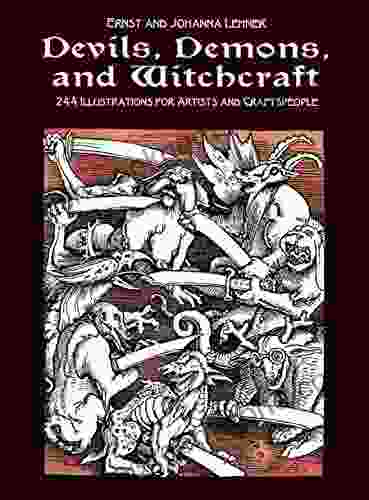
 Eric Nelson244 Illustrations For Artists Dover Pictorial Archive: A Visual Odyssey for...
Eric Nelson244 Illustrations For Artists Dover Pictorial Archive: A Visual Odyssey for...
 Grayson BellIt All About The Urn: An Exploration of Ancient Burial Practices and Modern...
Grayson BellIt All About The Urn: An Exploration of Ancient Burial Practices and Modern...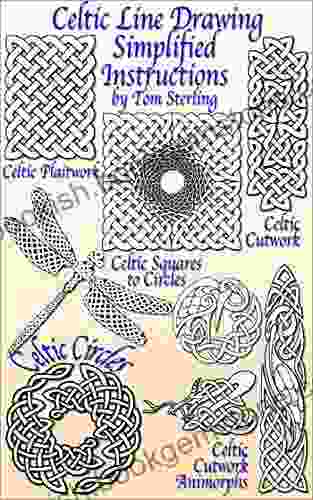
 Russell MitchellCeltic Line Drawing Simplified: A Step-by-Step Guide to Create Intricate...
Russell MitchellCeltic Line Drawing Simplified: A Step-by-Step Guide to Create Intricate... Felix HayesFollow ·7.5k
Felix HayesFollow ·7.5k Percy Bysshe ShelleyFollow ·16.5k
Percy Bysshe ShelleyFollow ·16.5k Albert ReedFollow ·7.6k
Albert ReedFollow ·7.6k Bruce SnyderFollow ·8.1k
Bruce SnyderFollow ·8.1k Esteban CoxFollow ·13.3k
Esteban CoxFollow ·13.3k Cade SimmonsFollow ·9.6k
Cade SimmonsFollow ·9.6k Alex FosterFollow ·8.4k
Alex FosterFollow ·8.4k Morris CarterFollow ·3.8k
Morris CarterFollow ·3.8k

 Marvin Hayes
Marvin HayesBarn Find Road Trip: Unearthing Hidden Automotive...
In the realm of automotive...

 Griffin Mitchell
Griffin MitchellWorkbook for Bessel van der Kolk's "The Body Keeps the...
Trauma is a pervasive issue that affects...

 Kevin Turner
Kevin TurnerExploring the Enchanting Islands of Puerto Rico:...
Embark on an...

 Mike Hayes
Mike HayesDiscover Santa Fe's Enchanting Charm with the DK...
Nestled at the foot of the...

 Colby Cox
Colby CoxConversational Arabic Quick and Easy: Yemeni Arabic...
Welcome to the exciting...
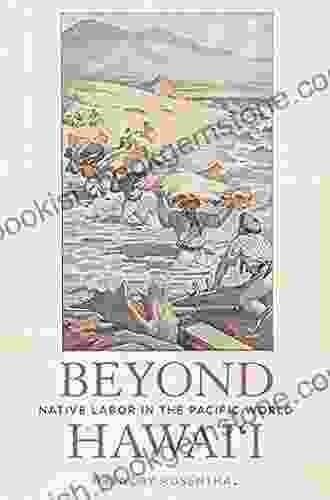
 Davion Powell
Davion PowellNative Labor in the Pacific World: A Comprehensive...
The Pacific World, encompassing the vast...
4.7 out of 5
| Language | : | English |
| File size | : | 48182 KB |
| Text-to-Speech | : | Enabled |
| Screen Reader | : | Supported |
| Enhanced typesetting | : | Enabled |
| Print length | : | 376 pages |


